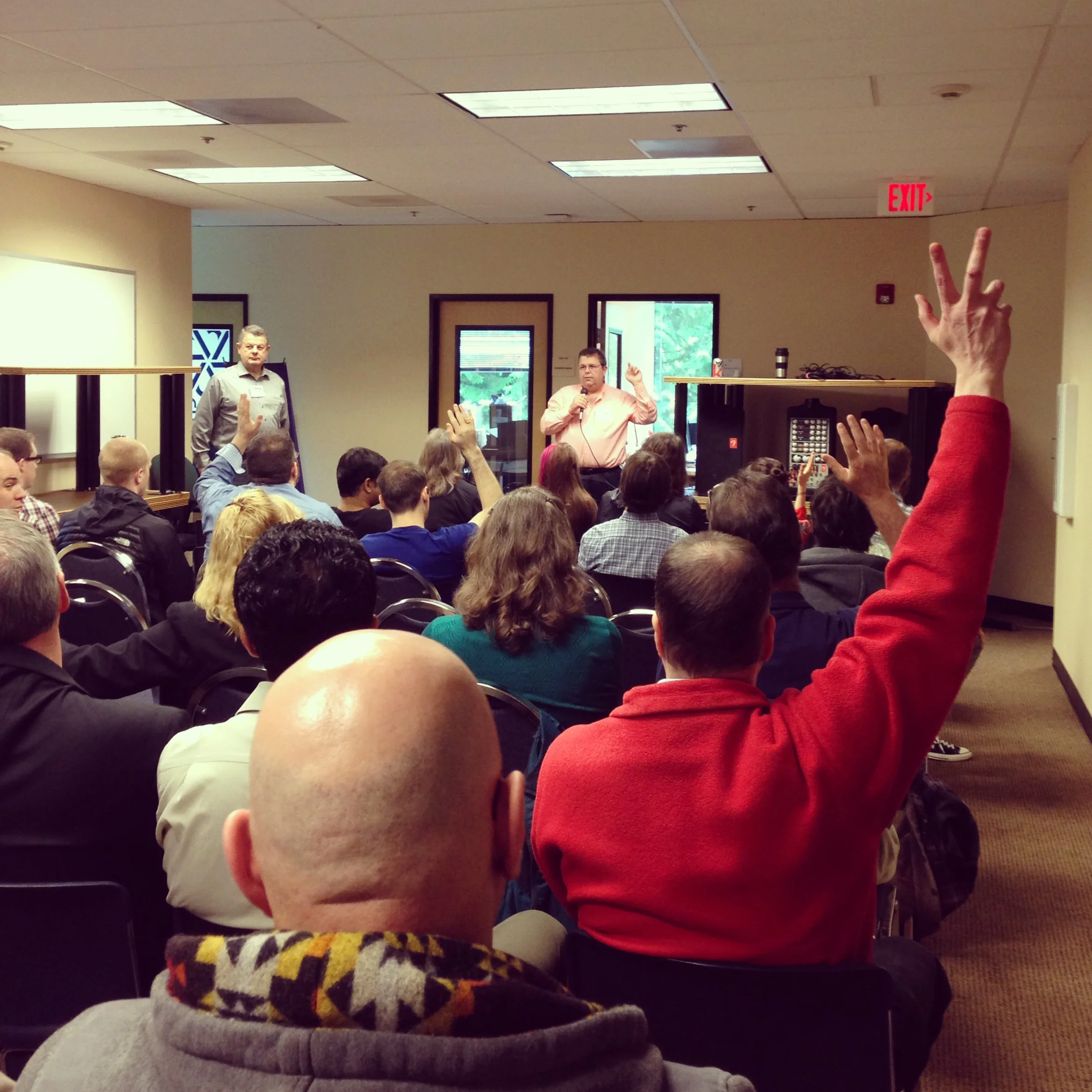I’ve heard a lot about the Internet of Things (IoT) lately. Entrepreneurs were buzzing about it at PDXTTM #2 and referenced it in a product pitch. My co-workers are buying Raspberry Pi’s (credit card sized computers) to hack on. Analysts are predicting that 6 billion devices will be internet-connected by 2015, and will soon surpass the world’s human population of 7 billion. Something very disruptive is happening, and I wanted to learn more about it.
Luckily, as with most interesting technologies, there’s a Portland meet-up for that! I attended my first IoT meet-up last Tuesday, and my mind has been full of ideas ever since.
The Event - Thing Tuesday
Thing Tuesday gathers every month or so and consists of "show and tells" given by local folks who make IoT devices. Last week five presenters covered a wide variety of IoT topics, ranging from sales pitch advice to stories about soldering.
Frank D’Andrea from Tater Tots Designs kicked things off with the cautionary tale of pitching a "Smart Blender" idea to a major appliance company. Frank commented on the lack of established protocols defining how "smart devices" should communicate. He also warned that large appliance companies can take a very long time (2+ years!) to approve a project proposal. The margins are very thin in consumer products, so they don’t have much budget left make your iPhone a remote control for your blender. Frank thinks it’s still early days for IoT, so you may need to build things like the communication layer (HTTP in this case) yourself.
Two consultancies from neighboring cities described their services. Both helped local start-up VendScreen launch its product. The first, Rigado of Salem, helps with firmware design. They can turn your idea into a functional prototype for around $10-20k, which you can then show investors. Rigado also handles the paperwork to get your product approved by the FCC. The second consultancy, RelianceCM of Corvallis, is a "Contract Manufacturer." They help turn your prototype into a real product, and can crank out 10,000+ units for you. They’re financially incentivized to make your product a success, so they help you lower production costs and select the best components (e.g. ones that aren’t already obsolete).
The most in-depth and enthusiastic presentation was given by Dr. Alan Campell of NW Vineyards. It’s difficult to describe Alan’s specialty. He holds several biology-related degrees and uses various technologies to analyze vineyards. I like to think of him as "Wine MacGyver". He explained how, after four months of effort, he assembled and then buried several Wi-Fi connected, sensor-packed devices in a client’s vineyard. The devices track soil moisture, temperature, and other fun facts then report that data back to the cloud. This helps vineyard owners decide when to prune the grape leaves, harvest, etc. He built the devices using a hardware platform called Waspmote. Soldering, PVC pipe, and Wi-Fi signal boosting were also involved. To Alan, the hardest part was writing the code to send the data back to the central server. Even Wine MacGyver had to find a programmer to help build that piece.
Who I Met
I met Scott Schaus who works at GlobeSherpa. I just recently read about their app’s debut, and they already employ 12.5 people! Andrew Voss told me about his start-up and how much he enjoyed working out of NedSpace. I also met Chris Schuermyer who, like me, has a software background and wanted to learn more about the hardware side of things.
What I Learned
Local folks are very interested in the IoT idea. They’re trying to solve some basic problems. I learned a lot from the types of questions they asked:
- Which hardware platform should I use? Raspberry Pi, Arduino, Yocto?
- How should my Thing talk to the internet? Wi-Fi, Bluetooth, 3G, LTE?
- How can I lower the power consumption?
- Where do I store all the device senor data?
Wrap Up
This meet-up reminded me of what I’ve read about the Homebrew Computer Club, the computer hobbyist user group where the Steves (Jobs and Wozniak) famously demoed early Apple computer prototypes. Just like that inspiring time in the mid-seventies, low cost off-the-shelf components are coming to market that enable tinkers and hobbyist to piece together innovative new ideas.
Building an IoT product seems possible with some research and plenty of elbow grease. It’s like plugging Lego pieces together. Granted, today’s IoT Lego set is for advanced users, but it’s getting easier. I’ve been interested in the Quantified Self concept, and IoT seems to enable a Quantified World. I need to do some more research, and I’ll share some links with y’all in a future blog post.
Next Month
I’m not sure yet which PDX tech event to attend in August. Maybe I’ll check out pdxdevops or Mobile Portland. If you have any suggestions you should definitely let me know! I’ll owe you one :)


















